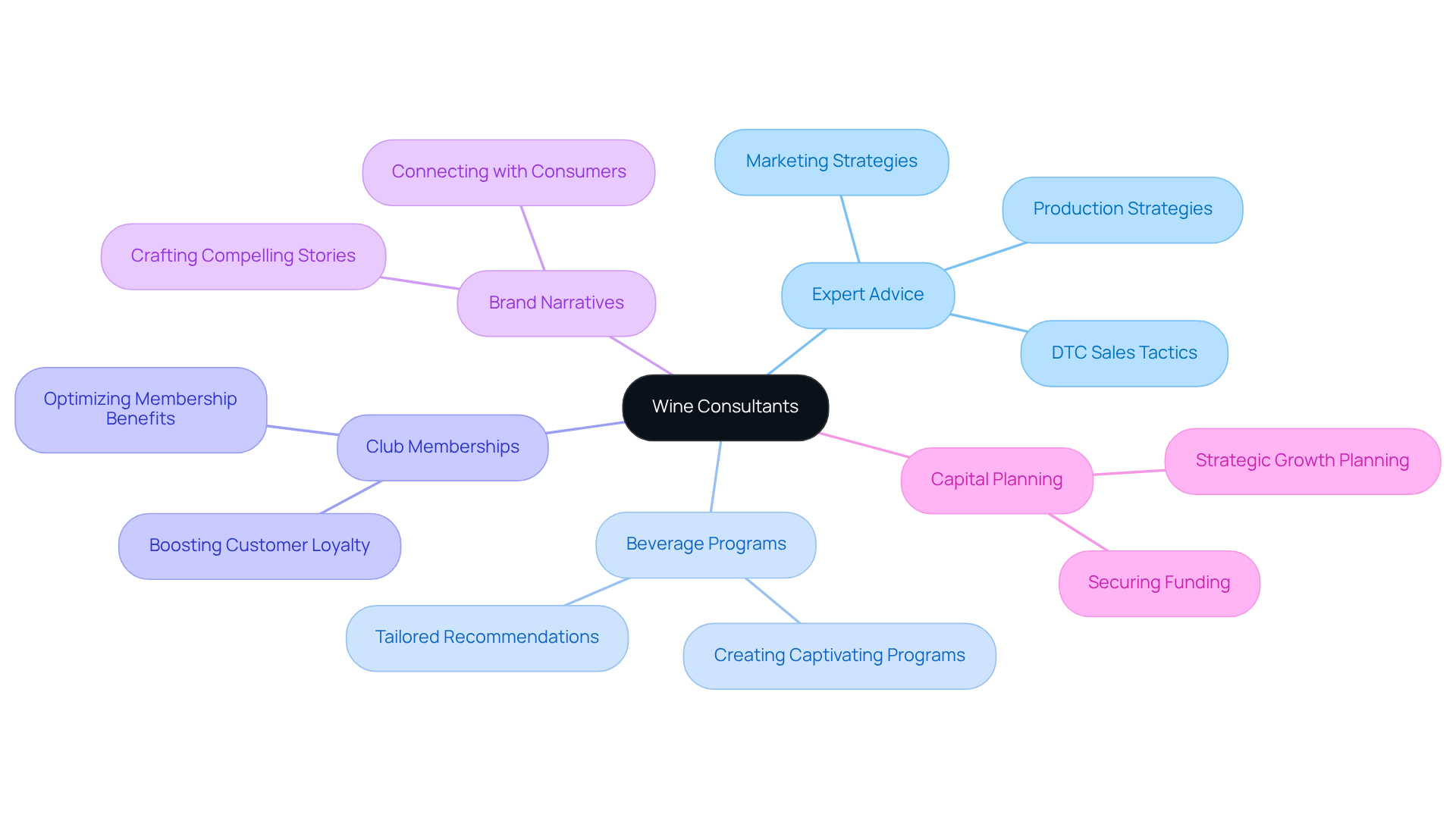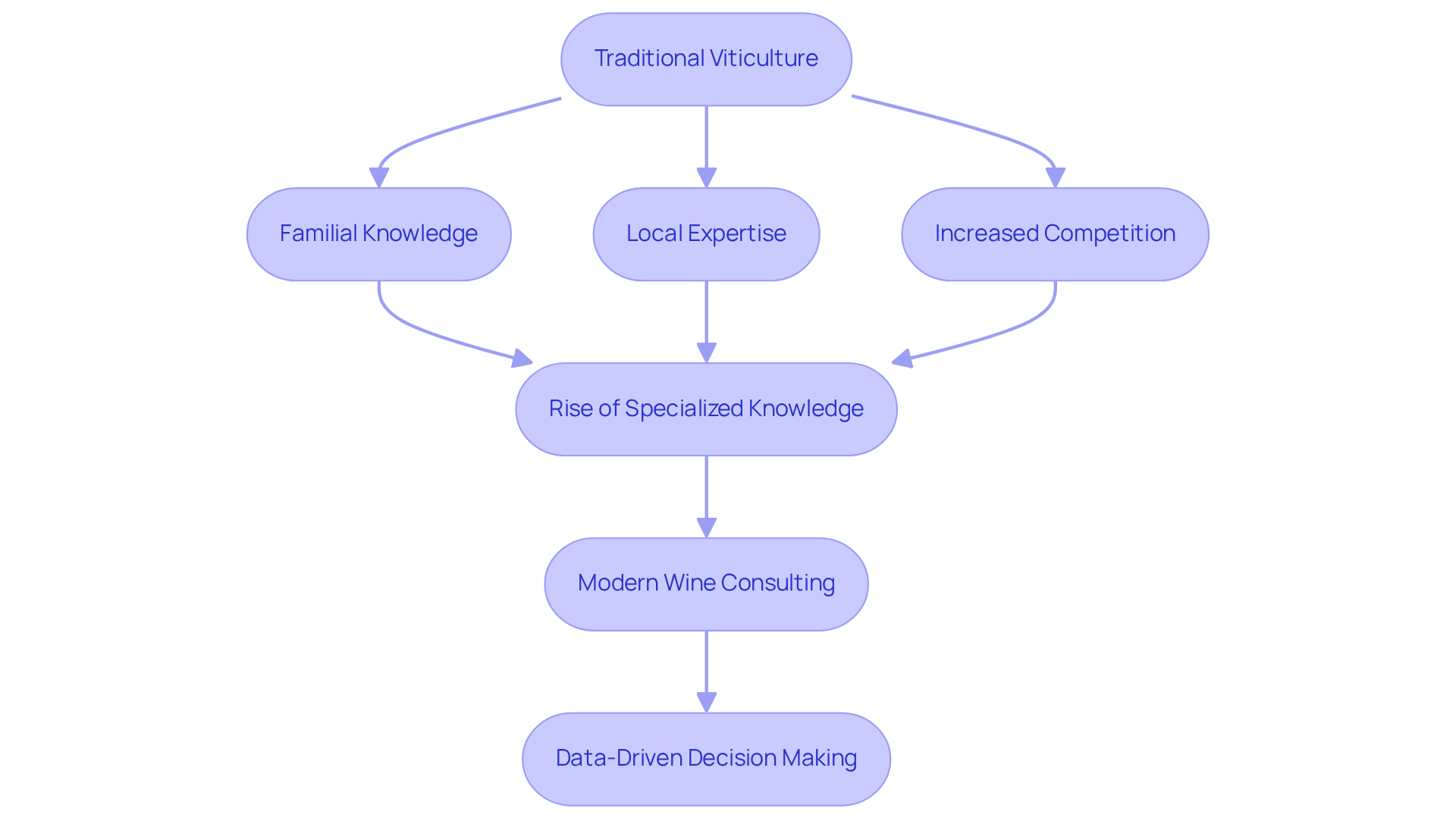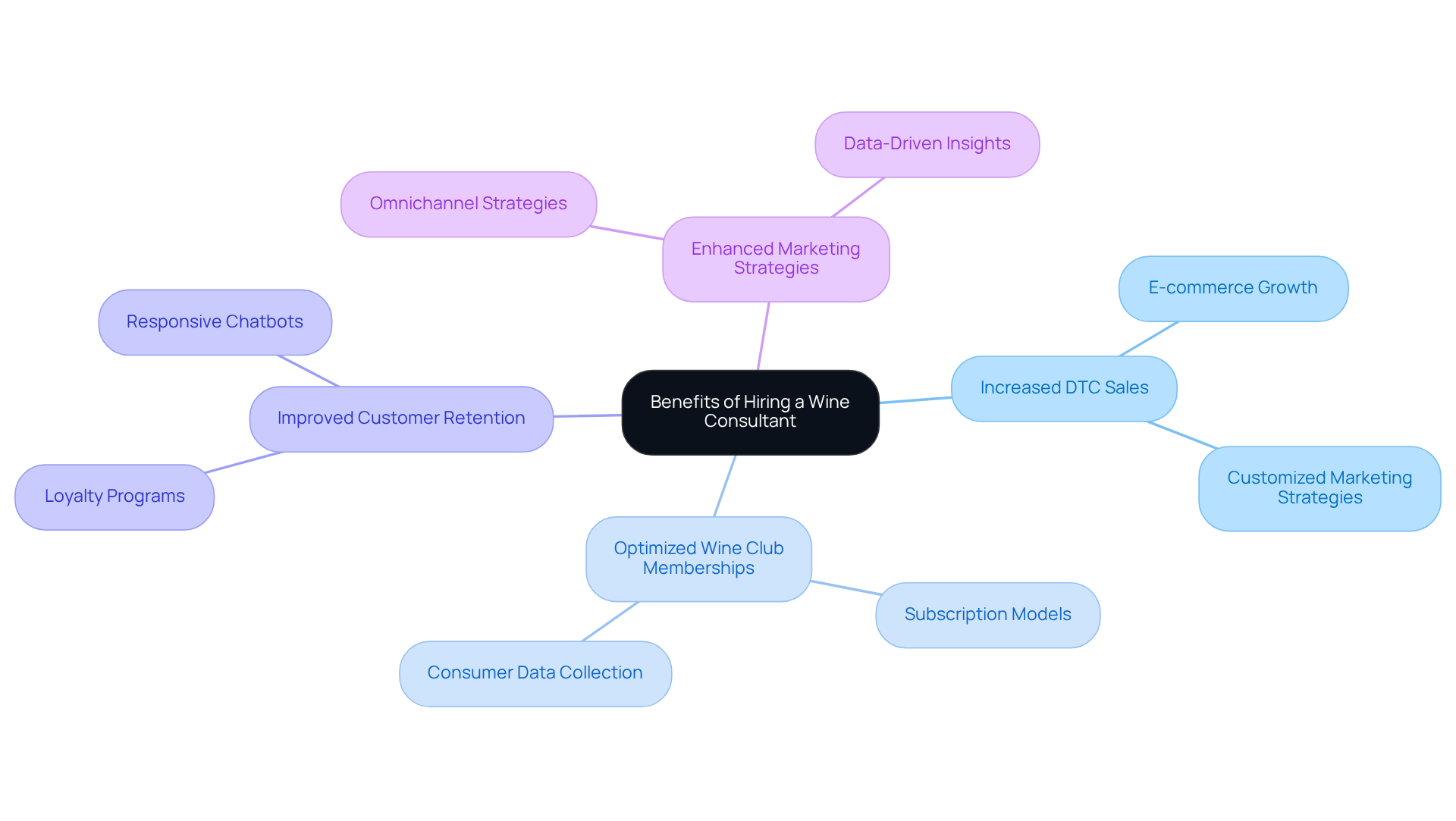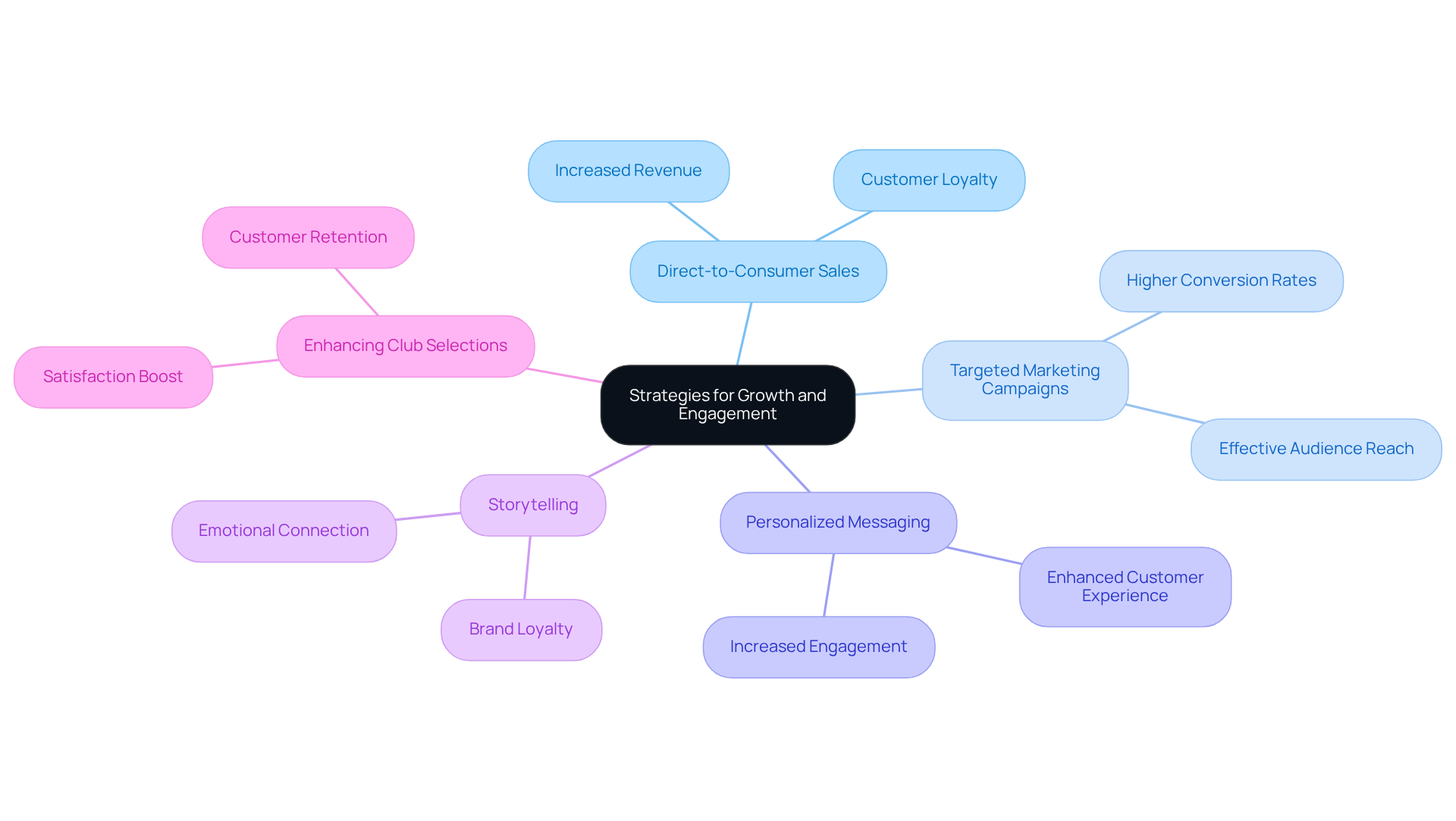Overview
Wine consultants are pivotal in driving winery growth and engagement, offering specialized advice on winemaking processes, marketing strategies, and direct-to-consumer sales tactics. Their expertise is not just theoretical; it translates into substantial increases in e-commerce sales and customer retention.
For instance, wineries have reported an impressive average growth of 191% in online sales, underscoring the profound impact of their strategic guidance on both revenue and consumer relationships. This data highlights the critical role that wine consultants play in enhancing business performance, prompting wineries to consider their services as essential for success.
Introduction
Wine consultants have emerged as pivotal players in the evolving landscape of the beverage industry. They skillfully merge traditional practices with modern strategies, driving growth and engagement for wineries. By leveraging their expertise, these specialists empower vineyards to enhance direct-to-consumer sales, refine marketing approaches, and cultivate deeper connections with consumers.
However, as the market faces increasing competition and shifting consumer preferences, what specific strategies do these consultants employ to ensure their clients not only survive but thrive? This question prompts a deeper exploration into the actionable insights and innovative methodologies that define successful wine consulting.
Define Wine Consultants: Roles and Responsibilities
Wine consultants in the beverage sector are specialized experts who provide invaluable advice to wineries, vineyards, and various stakeholders within the industry. Their roles encompass a broad spectrum of responsibilities, including advising on winemaking processes, crafting marketing strategies, and implementing direct-to-consumer (DTC) sales tactics. They play a crucial role in developing beverage programs, optimizing club memberships, and enhancing brand storytelling to resonate with consumers.
By utilizing their extensive understanding of grape types, production methods, and contemporary market trends, beverage advisors enable clients to manage the challenges of the industry efficiently. Successful projects have shown that vineyards can attain considerable expansion in DTC sales through customized approaches. Data show that wineries using advisory services have experienced an average growth of 191% in e-commerce sales, along with a significant increase in online beverage purchasers from 1.5 million to 4.1 million, highlighting the advisors' influence on enhancing revenue and fostering customer interaction.
Key functions of wine consultants include:
- Providing expert advice on production and marketing strategies.
- Assisting in the creation of captivating beverage programs that attract consumers.
- Improving club memberships to boost customer loyalty.
- Crafting compelling brand narratives that connect with target audiences.
- Supporting strategic capital planning to secure necessary funding for growth.
The cooperative method of beverage advisors, frequently including discussions with grape producers and estate groups, is crucial for developing flexible plans that tackle the distinct obstacles encountered by each vineyard. This adaptability is particularly important in a rapidly evolving market, where consumer preferences are shifting towards stylistic diversity and personalized experiences, as well as in response to urgent challenges posed by climate change. Overall, wine consultants are instrumental in driving sustainable growth and fostering meaningful connections between producers and their customers, utilizing proven DTC strategies to transform casual visitors into loyal clients.

Explore the Evolution of Wine Consulting: From Tradition to Modernity
The evolution of beverage consulting can be traced back to the early days of viticulture, where knowledge was traditionally passed down through generations. Initially, winemakers relied on familial and local expertise to inform their practices. However, as the beverage industry expanded and competition intensified, the demand for specialized knowledge grew significantly.
Today, wine consultants are indispensable beverage experts, offering insights that seamlessly integrate traditional production methods with contemporary marketing strategies, particularly effective approaches for . This transformation mirrors a broader industry trend emphasizing the importance of data-driven decision-making and consumer engagement.
For example, the global organic beverage market, currently valued at $12.4 billion, is projected to grow by over 10 percent in the next five years, underscoring the necessity for producers to adapt to shifting consumer preferences.
Modern wine consultants now play a pivotal role in guiding vineyards through these changes, ensuring they remain competitive in a rapidly evolving market. Their expertise not only enhances operational efficiency but also cultivates deeper connections with consumers, ultimately driving predictable DTC revenue and fostering loyalty—both essential components for sustainable growth.

Identify Key Benefits of Hiring a Wine Consultant for Your Winery
Engaging a beverage expert can significantly elevate the market presence of family-run vineyards. These specialists provide tailored strategies that enhance direct-to-consumer (DTC) sales, optimize wine club memberships, and refine brand storytelling. For example, vineyards collaborating with advisors often experience remarkable growth in e-commerce sales, with some reporting increases exceeding 190% in online transactions. This surge is further supported by improved customer retention rates, as consultants implement customized programs that cultivate loyalty among consumers.
Consultants deliver an invaluable external perspective, pinpointing areas for improvement that internal teams may overlook. Their expertise empowers vineyards to effectively tackle challenges such as cash flow management and intensified market competition. By leveraging data-driven insights, vineyards can refine their marketing strategies, ensuring alignment with evolving consumer preferences.
Success stories abound, showcasing vineyards that have engaged advisors to enhance their online commerce systems and drive revenue growth. The adoption of omnichannel strategies has enabled brands to streamline messaging across various platforms, resulting in a cohesive brand presence that appeals to a wider audience. Furthermore, the integration of responsive chatbots on e-commerce sites has optimized customer support, enriching the shopping experience.
Ultimately, the not only addresses immediate sales challenges but also lays the groundwork for sustainable growth, establishing them as indispensable resources for producers striving to thrive in a competitive landscape.

Implement Effective Strategies: How Wine Consultants Drive Growth and Engagement
Wine consultants employ a range of strategic initiatives designed to drive growth and enhance engagement for vineyards. Central to their efforts is the establishment of robust direct-to-consumer (DTC) sales channels, which have demonstrated effectiveness in boosting revenue. For example, establishments that execute targeted marketing campaigns frequently experience notable increases in conversion rates, with recent statistics revealing that 27% of new wine club signups now stem from digital channels. By leveraging consumer data, wine consultants craft personalized marketing messages that resonate with distinct audiences, thereby fostering engagement and loyalty.
Moreover, storytelling serves as a pivotal element in forging connections between consumers and a winery's heritage and values. Through the art of narrative, professionals cultivate a , which in turn promotes repeat business. This strategy not only enhances immediate sales but also nurtures long-term customer relationships, a critical factor for sustainable growth in a competitive market.
Furthermore, the enhancement of club selections represents another area where advisors excel. By customizing experiences to align with customer preferences, they significantly boost satisfaction and retention rates. The dual focus on immediate sales growth and enduring customer loyalty positions wine consultants as essential allies in shaping the future success of wineries.

Conclusion
Wine consultants serve as indispensable partners in the beverage industry, offering specialized expertise that significantly contributes to the growth and engagement of wineries. Their diverse roles include advising on winemaking processes, developing marketing strategies, and executing effective direct-to-consumer sales tactics. By leveraging their profound understanding of market trends and consumer preferences, wine consultants empower wineries to navigate challenges and capitalize on opportunities, ultimately fostering sustainable growth.
Key insights throughout the article underscore the transformative impact of wine consultants on the industry. Their proficiency in crafting compelling brand narratives, optimizing club memberships, and employing data-driven strategies has been demonstrated to result in substantial increases in e-commerce sales and customer loyalty. Moreover, the evolution of wine consulting from traditional methods to modern, adaptive strategies highlights the necessity for wineries to embrace expert guidance in an increasingly competitive landscape.
As the beverage industry continues to evolve, the importance of engaging a wine consultant cannot be overstated. By cultivating meaningful connections between producers and consumers, these experts not only enhance immediate sales but also establish a foundation for long-term success. Wineries aiming to thrive should recognize the advantages of hiring a consultant, as their strategic insights and tailored approaches can convert challenges into growth opportunities, ensuring a prosperous future in a constantly changing market.
Frequently Asked Questions
What is the role of wine consultants in the beverage sector?
Wine consultants are specialized experts who provide advice to wineries, vineyards, and industry stakeholders on winemaking processes, marketing strategies, and direct-to-consumer (DTC) sales tactics.
What responsibilities do wine consultants have?
Their responsibilities include advising on production and marketing strategies, creating beverage programs, improving club memberships, crafting brand narratives, and supporting strategic capital planning.
How do wine consultants help wineries increase sales?
Wine consultants utilize their knowledge of grape types, production methods, and market trends to help wineries manage industry challenges, leading to significant growth in DTC sales. Wineries using their services have seen an average growth of 191% in e-commerce sales.
What impact have wine consultants had on online beverage purchasing?
Their influence has contributed to an increase in online beverage purchasers from 1.5 million to 4.1 million, demonstrating their effectiveness in enhancing revenue and customer interaction.
Why is adaptability important for wine consultants?
Adaptability is crucial for addressing the unique challenges faced by each vineyard, especially in a rapidly evolving market with shifting consumer preferences and the impacts of climate change.
How do wine consultants contribute to customer loyalty?
They improve club memberships and create engaging beverage programs that attract consumers, fostering customer loyalty and meaningful connections between producers and their customers.
What methods do wine consultants use to develop strategies for vineyards?
They often employ a cooperative method that includes discussions with grape producers and estate groups to create flexible plans tailored to each vineyard's specific needs.




